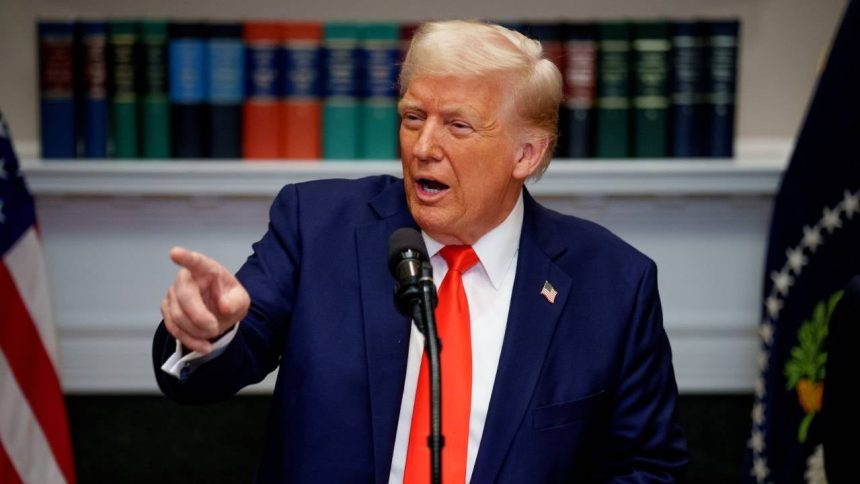Andrew Harnik / Staff / Getty Images
On March 6, President Donald Trump signed an executive order creating the Strategic Bitcoin Reserve. Trump’s order also creates the United States Digital Asset Stockpile, which will hold other cryptocurrencies.
The Strategic Bitcoin Reserve will initially hold all the bitcoins held by the Department of the Treasury that were forfeited as part of criminal and civil actions. In contrast, the Digital Asset Stockpile will own all other cryptocurrencies that have been forfeited in similar proceedings.
The executive order further specifies that the U.S. may acquire more bitcoins for the reserve — but only if done in a “budget neutral” way. That is, any purchases must be offset by spending cuts elsewhere in order to not raise the U.S. budget deficit. However, per the order, the U.S. will not actively buy any of the thousands of other cryptocurrencies for the digital asset stockpile.
The U.S. already owns around 200,000 bitcoins through various forfeitures, according to U.S. crypto czar David Sacks, and these coins would be the first to fund the Strategic Bitcoin Reserve. This haul of roughly 200,000 bitcoins is worth about $18 billion at current market prices.
Trump’s executive order, however, does not provide specific plans for the U.S. to actively buy Bitcoin or any other digital currency, only to “re-assign” already held coins into these reserves.
Need an advisor?
Need expert guidance when it comes to managing your investments?
Bankrate’s AdvisorMatch can connect you to a CFP® professional to help you achieve your financial goals.
Cryptocurrency is still full of risks
Despite Trump’s move, cryptocurrency remains full of risks. And if the U.S. does begin buying Bitcoin, as opposed to just collecting forfeited crypto assets, then the U.S. and its taxpayers would face those risks, too.
Cryptocurrency is backed by nothing
Bitcoin and virtually all other cryptocurrencies, such as Ethereum and Dogecoin, are not backed by anything. There are no assets or cash flow of some underlying entity that gives them value, as is the case with stocks and bonds. The only thing supporting the price of cryptocurrencies is what other traders will pay for them. If demand dries up for them, their price falls.
This kind of investment — in which the gain depends entirely on someone else buying the asset for more — is what investors call “the greater fool theory of investing.” Because Bitcoin does not have any fundamental value, the only way for traders to make money is to sell cryptocurrency to someone who thinks it’s going to be worth more. This understanding is why it’s so important to generate hype — to keep people buying crypto and pushing the price up.
Cryptocurrency enables criminality
Beyond the poor investment case for cryptocurrency, cryptocurrency can enable criminality by providing a means to send money anonymously or semi-anonymously. In particular, crypto allows criminals to launder money as investors on the other side of a transaction buy coins.
So, if the U.S. government does begin purchasing cryptocurrencies, as opposed to simply moving existing coins into a stockpile, then it could potentially be further enabling criminals.
Cryptocurrency cannot buy legitimate goods and services
Virtually no legitimate business actually uses cryptocurrencies, such as Bitcoin and Ethereum, to buy legitimate goods and services. Nearly a decade ago, a handful of businesses rolled out the possibility of using crypto to buy legal products. In just a few years, these companies removed the possibility, because no one was actually using crypto to do so.
Moreover, the volatility of cryptocurrency makes it virtually useless as a currency. No one wants to use a currency where the price could multiply your purchase price from one day to the next, depending on how speculators decide to price your currency that day.
Cryptocurrency is hackable
Beyond all these concerns, however, is the risk that cryptocurrencies such as Bitcoin are simply worth nothing if they can be hacked. Unlike gold, which can be physically secured, the code for cryptocurrencies is sitting out there waiting to be compromised. While it hasn’t happened yet, the growing value of Bitcoin gives plenty of bad actors an incentive to find a way to crack its code.
Moreover, if the U.S. government begins actively investing in cryptocurrencies, it provides these same bad actors even more incentive to find a way to rip off the world’s wealthiest country.
Editorial Disclaimer: All investors are advised to conduct their own independent research into investment strategies before making an investment decision. In addition, investors are advised that past investment product performance is no guarantee of future price appreciation.
Read the full article here














